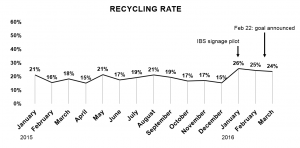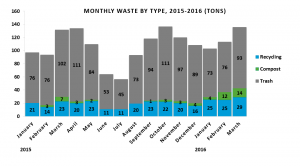As the semester draws to a close, it marks a busy year for sustainability improvements at Brandeis. Last July, Mary Fischer began her term as Brandeis’ manager of sustainability programs. Since then, Fischer has implemented a new recycling initiative and multiple sustainability competitions, and started setting goals for next year.
The recycling initiative officially launched in February when Fischer ensured every trash can was paired with a recycling bin and added new signage. The goal of the initiative is to reach the national average recycling rate of universities: 40 percent of waste by the end of 2016 and 30 percent by the end of this semester. Brandeis’ average recycling rate this year has been 20 percent, though it has been approximately 25 percent since February.
Brandeis piloted new signage in the International Business School in January, and announced the campus-wide recycling challenge on Feb. 22.
 The university’s composting rate has seen an even sharper increase. Since October there have been plans to improve composting in the dining halls on campus. “I think recycling is a good story, but composting is really the best story,” said Fischer. From September to January, Brandeis composted an average of five tons
The university’s composting rate has seen an even sharper increase. Since October there have been plans to improve composting in the dining halls on campus. “I think recycling is a good story, but composting is really the best story,” said Fischer. From September to January, Brandeis composted an average of five tons
a month. In February, this increased to 12 tons and in March to 14 tons.
Brandeis supplied kitchen staff with compostable bags made from corn, which bypassed the logistical hurdle of dumping food waste without also throwing away the non-compostable bags. Dining hall staff were also educated on what could be composted and what could not. Each preparation station in the dining halls was also given a smaller bucket for compost. “We put everything in place so it’s easy as possible,” said Fischer.
The increase in composting rates so far comes just from refining the practices in the dining halls, and not other places on campus, said Fischer. In the following months, the same compost friendly bags will be added in other locations such as Upper Usdan, which already has composting bins.

In terms of sustainability culture at Brandeis, Fischer hopes it will shift from administrative driven projects to more student driven projects. “Getting students to drive some of the passion that they have around all sorts of other things around campus and putting some of that towards sustainability would be ideal,” she said.
One of the ways Fischer has encouraged students and faculty to be more conscience of their environmental presence is through sustainability contests. Last semester there was a competition between first-year quads North and Massel, won by Gordon Hall, whose residents reduced its electricity usage by 10 percent. In the competition between Ridgewood, Ziv and the Village, Ridgewood was the winner, also reducing energy usage by 10 percent. Fischer also announced an Instagram takeover competition where students who posted the most were awarded prizes.
In the office and academic building competition, 60 Turner St. reduced their energy usage by 36 percent, according to a graph on the Sustainable Brandeis page. The office at 480 Old South St. used 33 percent less energy, and six other buildings reduced their rate between one and five percent. The rate for the Heller School’s building increased by 0.6 percent during the competition.
The key to these competitions, says Fischer, is that they are fun. The winners of each building competition are awarded with a pizza party and get their names engraved on a trophy.
In addition to recycling, the sustainability task force at Brandeis will be focusing on gas and electricity usage. Compared to similar campuses, Brandeis uses approximately 25 percent more energy per square foot, which costs about $11 million a year. One possible target of high electricity usage is the Light of Reason, the recently installed art installation in front of the Rose Art Museum. “If I had it my way I would only light it up at special times,” said Fischer.
The upcoming academic year will involve more initiatives by Fischer and the taskforce on campus sustainability. For Fischer, her largest challenge so far has been connecting. “All over campus there are groups of people who really care about the environment and sustainability and climate change, but they’re not necessarily connected with one another. Hopefully next year I can really start to congeal everyone or at least have more lines of communication between each other,” she said.


